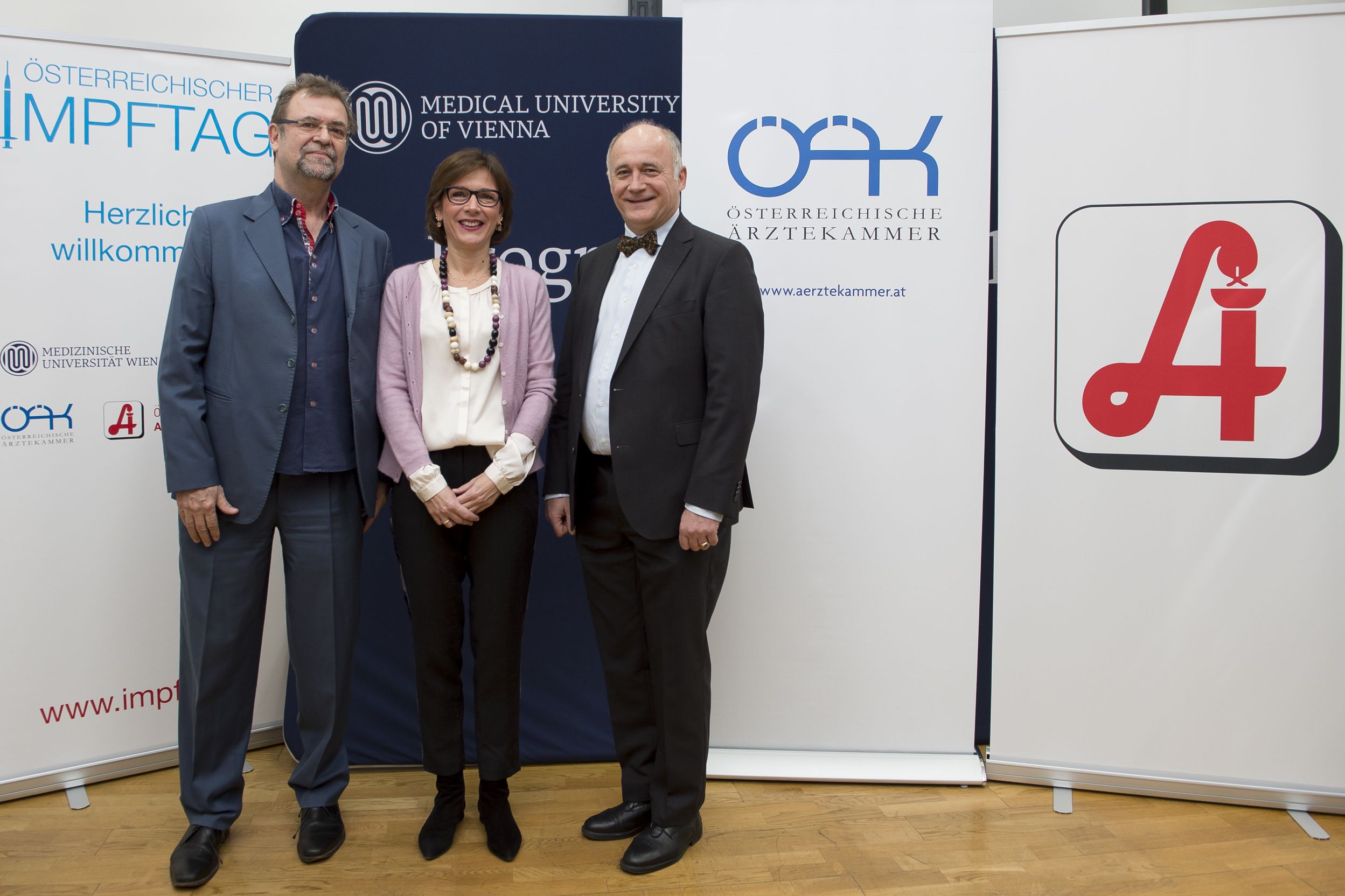
(Vienna, 12 December 2017) Austrian Vaccination Day 2018 is going under the slogan "Vaccines of the future - Where are we heading?" It will not only be about what improved vaccines we can expect in future against influenza, whooping cough or herpes zoster. "It is also about what new vaccines are being developed, not only against infectious diseases but also against societal diseases," explains Ursula Wiedermann-Schmidt, scientific director of Austrian Vaccination Day and Head of MedUni Vienna's Institute of Specific Prophylaxis and Tropical Medicine, speaking at a press conference in Vienna on Tuesday. It will include the results of the first successful trial in the development of a possible vaccine against Alzheimer's. Another important topic is the everyday advice given by doctors and pharmacists about vaccination, which needs to be trustworthy and easy to understand.
It is a matter of training the human immune system to react against the proteins that are typical of Alzheimer's, such as amyloid beta or TAU proteins, which are thought to be partially responsible for causing the disease. In collaboration with MedUni Graz, the Department of Clinical Pharmacology at MedUni Vienna is playing a major role in the development of a TAU-protein-based vaccination against progressive Alzheimer's disease. Preliminary results from the clinical trial give reason to hope that we have taken the first steps towards having a vaccination against the cause of Alzheimer's. MedUni Vienna is regarded as a world leader in the clinical research of this immunotherapy.
TAU proteins play an important role in material transport within neurons. If these proteins are hyperphosphorylated, that is to say saturated with phosphate groups, material transport is disrupted, resulting in functional disturbances and ultimately leading to cell death. This is one of the main characteristics of Alzheimer’s disease. The vaccine should prevent this disruption and thus halt any further memory loss. Around 10% of people aged over 65 and 33% of people aged over 80 suffer from Alzheimer's disease. It currently affects around 90,000 people in Austria.
"In future we will not only vaccinate against infectious diseases but increasingly turn our attention to such societal diseases," explains Wiedermann-Schmidt, also mentioning a possible vaccine against allergies – which is currently being worked on by the team led by Rudolf Valenta at MedUni Vienna's Institute of Pathophysiology and Allergy Research. The initial results of the study are so promising that it seems likely that, in the near future, it will be possible to vaccinate against colds and allergies even before they occur. However, in keeping with the slogan for Vaccination Day, the topic of travel vaccinations will also be discussed, as will the latest findings relating to vaccines against zika virus and dengue fever. "When it comes to new vaccines, people always ask: how safe are they?" says Wiedermann-Schmidt, acknowledging the public's concerns. "However, before a vaccine is licensed, it has to go through an enormous number of safety stages and tests. It is fair to say that vaccinations are generally safe."
"Despite the undisputed safety of vaccinations, in practice we are encountering more and more people who question it," says the spokesman for the division for vaccination matters of the Austrian Medical Association (ÖÄK), Rudolf Schmitzberger. However this is rarely due to out-and-out rejection. It is more often the case that parents find themselves in a moral dilemma. This is mainly due to all the disinformation that circulates on the Internet. "These parents are trying to be responsible and make the right decision for their child. Thus communications between doctors and patients play a key role, especially when it comes to vaccinations, as has now been confirmed by numerous studies conducted by psychologists and communication experts."
For example, safety consciousness, a constant that underlies all human behaviour, comes into effect when assessing risks. Says Schmitzberger: "In the context of vaccinations this means: the statistically insignificant risk of a reaction to the vaccine weighs disproportionately heavy compared with the enormous benefit of being protected from a disease." An entire workshop at Austrian Vaccination Day will therefore be dedicated to the subject of communication and putting over information. "The more aware we doctors are about the psychological mechanisms of the decision-making process, the better equipped we are to give trusted advice about vaccinations in daily practice," says the vaccination spokesman for the Austrian Medical Association.
Healthy society: professional advice in the pharmacy
Customers can obtain health advice in any of the 1,400 or so pharmacies in Austria. More educational work is required around the subject of vaccination than any other, because it is only through education that we will be able to combat preventable diseases. This is where pharmacists can provide vitally important consultations.
"Lack of knowledge about health can lead to many errors. For example, a vaccination sceptic can quickly turn into an anti-immunisation campaigner. That is why it is so important that, in the pharmacy, we provide tireless education on the subject of vaccination. Vaccination is the cheapest and most effective preventive measure known to science!" says Mag. pharm. Dr. Gerhard Kobinger, Board Member of the Austrian Chamber of Pharmacists. You can also find an overview of current vaccination recommendations and vaccines on the Austrian Chamber of Pharmacists' Apo App. The "Vaccinations" module serves as an electronic vaccination certificate.
Information for editors: You can access photographs of the press conference on 12 December 2017 immediately after the event under APA-OTS at: http://www.apa-fotoservice.at/galerie/11478
Austrian Vaccination Day 2018
Saturday, 13 January 2018, "Vaccines of the future – Where are we heading?" (Austria Center Vienna, Bruno-Kreisky-Platz 1, 1220 Vienna, 8:00 – 17:00 hrs). Austrian Vaccination Day is the largest future-oriented vaccination event for doctors and pharmacists in Austria and is organised by the Österreichische Akademie der Ärzte GmbH in collaboration with the Medical University of Vienna, the Austrian Medical Association and the Austrian Chamber of Pharmacists. For more information and to register: www.impftag.at